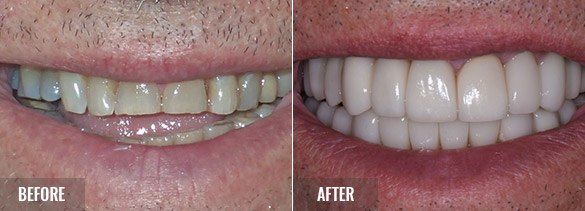Do you wake up feeling like you haven’t got a full night of rest? Is this sometimes accompanied by a headache or a toothache? Are you experiencing jaw joint pain? Has Dr. Lepore or Dr. Dougherty at Lepore Comprehensive Dentistry in Dunedin, Florida, noticed during your routine dental exams that your teeth have been flattened or that you’re developing cracks in your teeth? Teeth grinding or bruxism can occur while you are awake or asleep. Unconsciously clenching your teeth is typically associated with bruxism.
Your teeth should only make contact for around three to four minutes during the day when you chew your food. When there is constant force on your teeth when grinding or clenching, tooth structure is worn away, exposing the sensitive inner layers of your teeth. Extreme bruxism can lead to cracks and fractures in your teeth.
You may have a temporomandibular jaw disorder (TMJ), which can contribute to jaw pain and bruxism.
Temporomandibular Joint Disorder, or TMD for short, is a condition involving the joints, muscles, nerves, and teeth involved with jaw movement. It could be related to one or all components. When not working harmoniously or in sync, or the chewing system is improperly aligned, a variety of signs or uncomfortable and potentially painful symptoms may result for patients.
The temporomandibular joint is the complex hinge that joins your lower jaw and skull together. It works similarly to a ball and socket but also has the unique ability to glide forward via a series of muscles, ligaments, and fibrous tissues all working together. Many factors can contribute to the development of TMD, including misalignment of the jaw and the way teeth touch, tooth clenching or grinding, arthritis, and posture issues. Anxiety and stress have also been shown to be related to TMD issues.
These factors may lead to inflammation of the joint and/or surrounding tissues, oftentimes triggering the connected pain receptors throughout the head, neck, and face. Common symptoms include jaw pain or soreness extending through the face and neck, jaw clicking or popping, restricted jaw movement or locking, sensitive teeth, loose teeth, irregular or excessive tooth wear, earaches, and headaches, amongst others.
The wide range of possible resulting symptoms is what has historically made correctly diagnosing TMD challenging. If your doctor suspects TMD might be an issue, they will perform a thorough physical examination of the area and overall chewing system, evaluating your jaw movement and noting any related tenderness or discomfort. Oftentimes, they will also take diagnostic images to aid the fact-finding process.
There are a variety of treatments available to assist with properly diagnosing and alleviating some or all TMD discomfort, depending on the nature and severity of the issues causing it. It is important to work closely with your doctor to create a treatment plan that best meets your unique needs.
COMMON SYMPTOMS OF BRUXISM
- Worn tooth structure
- Flattened teeth
- Tooth sensitivity
- Jaw soreness
- Tender facial muscles
- Headaches
- Audible grinding sounds that can be heard by others around you
Teeth grinding is commonly linked to airway disturbances such as sleep apnea or acid reflux. During your comprehensive examination, Dr. Lepore, Dr. Dougherty, and your hygienist will evaluate you for airway disorders.
Bruxism is a condition where a patient grinds, gnashes, and/or clenches their teeth. It is typically an unconscious behavior and can occur both while awake and sleeping. Common symptoms of bruxism include worn tooth structure and flattening of the teeth, increased tooth sensitivity, jaw soreness, tenderness of the facial muscles, and dull headaches. The grinding may be loud enough that it can be heard by others, especially if it occurs when you are asleep. Bruxism is commonly associated with airway disturbances like sleep apnea and gastric reflux.
The constant force of opposing teeth rubbing and grinding against each other causes the hard enamel outer layer of the teeth to wear away, exposing the soft inner dentin layer, making the teeth weaker, more sensitive, and could even become prone to decay. In addition, once the softer dentin is exposed, the pace of the wear will accelerate dramatically. Bruxism can also potentially lead to cracks or fractures in your teeth.
Excessive tooth wear causes many oral health complications, including unattractive and irregular tooth levels, uncoordinated chewing movements, jagged and sharp tooth edges, tooth pain, and eventual loss of the teeth altogether.
There are preventative and corrective treatment options for patients showing signs of bruxism. Treatment will vary based on the underlying cause, the severity of behavior, and the extent of tooth damage, making it critical to work closely with your doctor to proactively treat the issue before more damage occurs.
SLEEP-RELATED TEETH GRINDING / BRUXISM (SRB)
To brux or grind your teeth while sleeping may indicate that you have a sleep-related breathing disorder such as snoring or sleep apnea. As your body tries to take in more oxygen during a sleep “event,” a grinding habit, known as a rhythmic masticatory muscle activity (RMMA), occurs, causing spastic jaw opening/closing muscle activity resulting in grinding events.
Obstructive Sleep Apnea is a potentially serious sleep disorder in which breathing repeatedly starts and stops during sleep. It occurs when the throat muscles intermittently relax and block the upper airway during sleep. Some symptoms of sleep apnea are snoring, daytime sleepiness, headaches, irritability, anxiety, depression, memory loss, gastric reflux, and high blood pressure.
Patients with sleep apnea can stop breathing up to hundreds of times per evening for time periods ranging from five seconds to over a minute in length. While breathing is stopped and oxygen is restricted to the heart and brain, the increased heart rate and stimulation causes the body to momentarily wake. This disruption in sleep pattern is what causes excessive daytime drowsiness and exhaustion in patients.
If left untreated, the constant strain placed on the heart and brain, coupled with poor sleep quality and duration, can result in serious and dangerous complications to your overall health, including heart disease, stroke, mood disorders, and accidents related to daytime drowsiness.
TREATMENT FOR TEETH GRINDING
OCCLUSAL GUARD (NIGHT GUARD)
Left untreated, jaw disorders, headaches, and damage to teeth can develop. Dr. Lepore or Dr. Dougherty may recommend an oral appliance called a night guard (occlusal guard) to be worn while you sleep. An occlusal/night guard is a custom-fabricated removable oral appliance that fits over your teeth and can be an upper or lower guard. It is used to prevent the wearing down of teeth during sleep caused by grinding or clenching and can help extend the life of your teeth and restorations.
For patients experiencing tooth wear due to nighttime grinding and jaw clenching, your doctor may recommend an occlusal appliance - commonly called a nightguard or bite splint - to help alleviate the complications associated with the condition. It is not uncommon for tooth wear to be associated with certain airway or breathing conditions, so your doctor may discuss this with you as well.
An occlusal appliance is a device that is worn in the mouth overnight and creates a barrier between your upper and lower teeth, eliminating the damage they cause by rubbing against each other. It also promotes improved jaw and bite alignment, which can help address uneven tooth wear. Research has shown that a well-designed hard appliance will help to relax the musculature, reducing wear even when it is not being worn. There are several designs and styles of appliances available to assist with treatment. Your doctor will expertly design your individualized appliance to ensure optimal bite alignment and maximum protection from additional tooth wear. Given the potential for costly dental treatments caused by untreated tooth wear, it is critical to work closely with your doctor to proactively treat the issue before more damage is sustained.
ORAL APPLIANCE THERAPY FOR SLEEP APNEA
Should a sleep disorder be suspected, Dr. Lepore or Dr. Dougherty may recommend administering a home sleep test (HST) or polysomnography (In-Lab Sleep Test). Dr. Lepore or Dr. Dougherty will work with your primary care physician and medical specialists such as board-certified sleep physicians and otolaryngologists (Ear, Nose, and Throat – ENT) to determine the appropriate treatment would be should a condition of sleep-disordered breathing be diagnosed. While CPAP is the standard of care for sleep apnea, some patients choose oral appliance therapy as a comparable alternative.
For some patients experiencing obstructive sleep apnea, your sleep physician may recommend an oral sleep appliance to help alleviate the underlying symptoms and complications associated with sleep apnea which can include excessive daytime sleepiness, depression, high blood pressure, and night-time teeth grinding.
A sleep appliance is a device that is worn in the mouth overnight, designed to position the lower jaw slightly forward , thereby bringing the tongue forward, and expanding the throat in a way that keeps your airway open to facilitate unobstructed breathing while you are asleep.
There are several designs and styles of sleep appliances available to assist with treatment, all capable of being custom fitted to the contours of your mouth.
Given the potentially dangerous complications arising from untreated sleep apnea, it is critical to work closely with your dentist to develop a treatment plan that meets your unique needs and promotes your overall health.
PREVENT TOOTH DAMAGE NOW
Call Dr. Lepore or Dr. Dougherty today at (727) 608-4690 if you have any of the symptoms mentioned above or have concerns about your jaw and teeth.










